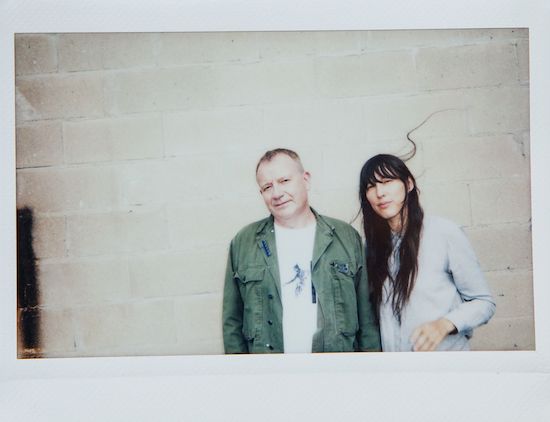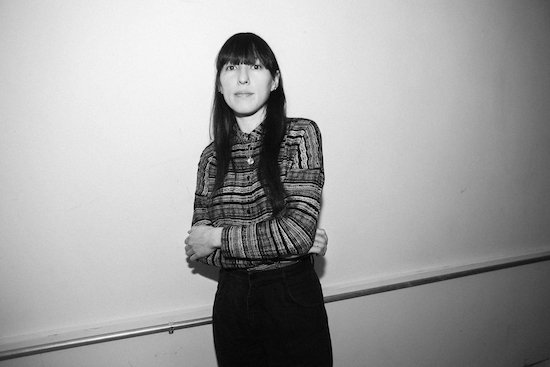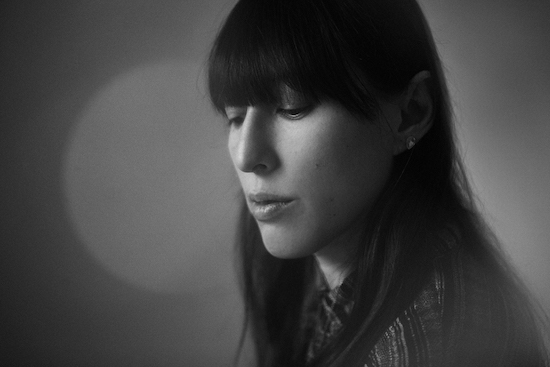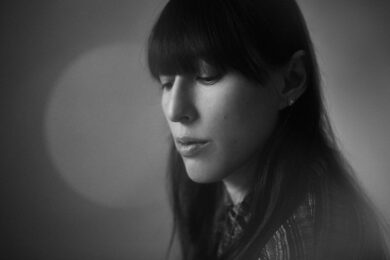Portraits by Lena Shkoda
In late 2011, long before the release of The Ghost Of Georges Bataille, her new collaborative record with Drew McDowall, Nicky Mao was on tour in Europe. "I was hired by a band for about four months," she says, "with minimal breaks in between. I was very unhappy to say the least, but I’d committed myself to quite a bit of time with them. Anyway, I’d been listening to a lot of The Fall on the tour. The day after our Manchester gig we drove to some town in the Netherlands. Upon arriving, I was shocked to see the poster for the show. We were to play with The Fall that evening. Watching Mark E. Smith perform that night, it became so apparent that I couldn’t go on with this band. His presence on stage was arresting, confrontational, and genuine. Nothing about the band I was performing in felt remotely like that. I felt exposed, and worse, I felt disingenuous. So, in the throes of this amazing racket, I came to my senses and quit the band.
"It was a series of moments," Mao continues, "many preceded and would follow that one. But it felt significant, like I needed to come to grips with some things – not get sidetracked by other people."
Those preceding moments Mao mentions were pivotal. By latter part of 2011, she’d already met a longtime collaborator in McDowall, and begun her journey into experimental electronic music as Hiro Kone, having recorded her first EP with Gang Gang Dance co-founder Tim DeWit earlier in the year. The moments that followed were no less important. By the end of 2012, her EP had been released, and she’d begun playing collaborative sets with McDowall. Within a couple of years, she’d record another EP with DeWit, The Unmoved Mover, and release a cassette of psychogeographic electronics, Fallen Angels, via the Atlanta-based avant-garde label Geographic North.
In 2015, Mao and McDowall began work on The Ghost Of Georges Bataille, just released in March by BANK Records NYC after having been sidelined by their solo endeavours. For her part, Mao was busy preparing Hiro Kone’s excellent debut LP, Love Is The Capital. A perfectly concise album of spacious, incisively political industrial techno, it was easily my favourite release of 2017. The two finally finished mixing Bataille last year. "In a way, it’s lived with us for a while, but not in a stale, frustrating way," says Mao. "I think it benefited from the time we took in this case. I don’t think the next one will take us nearly as long to complete." "Nicky’s a prolific idea generator and incredibly committed," says McDowall. "Sometimes it’s a struggle just to keep up, but I like working with someone that challenges you and keeps you on your toes. Our process on this record was a lot of really intense bursts of activity interspersed with great conversations."
While less explicitly political than Love Is The Capital, Bataille feels no less radical as the documentation of an ego-free collaborative process, of ideas transmuted into practice. By turns unsettling and sublime, the album seamlessly merges the abstract industrial explorations of McDowall’s recent work with the more beat-oriented ambience of Mao’s Hiro Kone releases. Neither collaborator dominates the proceedings. It’s a meeting of equals.
I spoke with Mao throughout the week following the album’s release. A continuation of our conversation a year ago, we discussed Bataille and his ghost, her collaboration with McDowall, modular synthesis, her time in New York City, and more.
So, why Bataille?
Nicky Mao: Actually, it originated with a story about a friend of ours who was communicating with Bataille via a Ouija board in order to come up with some titles for her paintings. The ghost was rather obscene and aggressive. She got so spooked that she ran around the room frantically throwing open all the windows and yelling for him to "Get out!" We just thought it was the funniest story. We couldn’t stop laughing about it, and I think I made a joke about calling the record The Ghost Of Georges Bataille. Of course, we are both admirers of his work, too. There are ideas that he presents so often that feel both sacred and familiar. For instance, in Erotism he addresses, through transgression and taboo, what exists outside of language and drives us – often unexplainable, often abhorrent. Particularly in the presence of Death. Death lights the world, but there’s nothing one can say for certain about it. It is a productive negativity, a driving force. Drew and I are both often motivated by the irrational and the unconscious, and so through sublimation, we create work.
Had you and Drew started working on the record before Bataille’s ghost ran amok?
NM: The story is an old one that I told him while we were upstate recording. We had set aside a week to record out of this little shed that we had on this piece of land we rent up in Palenville, New York. The land itself is a pretty wild place, formerly an artist colony and then a Catholic boys camp. There are all kinds of strange religious statuary tucked away around the property. You can imagine where the mind goes when you’re up there.
Do you find that the landscape of the Palenville property has a marked effect on the work you record there?
NM: Oh, certainly. It was going into fall when we recorded and still very warm. We’d stand outside at night in the pitch-black listening to the crickets, marvelling at how discordant and insanely loud such a seemingly quiet place could get.
Also, the shed itself is so run down, with screens for windows, and overrun by mice, spiders, and the occasional bat, so you felt like you were recording outside.
Listening to the record, I can hear it. Which has me wondering if you ever consciously attempted to evoke the space in the recordings? It seems like synthesis is perfectly suited to capturing the particulars and eccentricities of specific landscapes.
NM: Absolutely. Modular synthesis is great for this. The fact that you can, from its most basic form, take an oscillation, begin to attenuate and filter it into something that sounds familiar or alien is incredible. I really like the psychogeographical aspect of making recordings, too. Before I started with modular, I was doing field recordings and accustomed to processing them through samplers. At the time of the recording, I wasn’t yet working with modular, though. So all of that stuff on the album is Drew. I worked mainly with drums, synthesizers, and samplers at the time.

Did Drew’s expertise and artistry have anything to do with your embrace of modular synthesis?
NM: I remember being completely mystified by the modular synth when I first met Drew. I was using a Nord Lead 2X at the time, but I didn’t understand generative modular synthesis at all, so there was a lot of experimenting and just feeling my way around synthesizers, with no real understanding of how, say, an LFO really worked. Drew’s subsequent solo performances and albums, as well as our own collaboration, definitely encouraged me to begin working with modular. From then on, I experienced a sort of growth exponential to what I had before, including a deeper understanding of how things worked in relation to each other. I always compare the last ten years of my life writing and recording electronic music to learning a new language. There’s the rudimentary stuff, then comes a sort of fluency, and now there’s real self-expression and poetry.
That’s a terrific analogy. There’s that point in any sort of art practice at which you no longer need to think about how to make your tools work properly. And it’s so freeing. You can focus instead on how and why the tools / systems work like they do, which opens the door for real expression. It’s like that’s when you can finally make them speak your language.
NM: Exactly. And there’s actually a pretty good and sincere record of that process. I’ve released three EPs, two LPs, and appeared on a number of compilations over the years. I think it’s really funny when people come up to me after shows and say, "Oh, wow that was very different than what I expected." I don’t know, I’m so deep in the process, learning in an instinctual way – I lack the sort of self-consciousness that people who are really married to genre have. I’m a total outsider in that regard. In meeting Drew, I found such kinship, and it was a relief.
This might be a good point to talk more directly about your longstanding collaborative relationship with Drew, which, based on the music you’ve made together, is quite special. How did it come about?
NM: There was such mutual admiration from the start. It was 2010, when we met. At the time, I had this pretty incredible practice space that I shared in the basement of a long shuttered Catholic boys school across the street from my apartment in Brooklyn. The priest was this gregarious fellow, Father Jim, who basically said, "Whatever you want to donate every month," and dropped the keys on the table. So, it was a great time of experimentation, to have such a large 24-hour space and a lot of friends coming and going. My friend Ben Greenberg from Uniform built a studio down the hall from us, and over time Father Jim let others start to rent out the classrooms as art studios. Drew came over a couple times, and we’d mess around on our synths with our friend Robbie. We’d go for hours hardly speaking, just in the zone. Looking back on it now, in hindsight, that was the beginning of our collaboration.
At what point did you decide to record an album together?
NM: It was really apparent that we should record after we played a couple live shows together. It took us a while to get around to it, but once I joined Drew at the house upstate, we bought a PA, loaded up the car with supplies, and spent a week in isolation recording. On the album there are a lot of references to sleep. In sleep, being somewhat senseless, we can free ourselves from logic, tastes, and imperatives. I think that’s sort of a characterisation of what happens when we get together to play: we form this single membrane that is unconscious and receptive to what enters the space. Drew has said, when listening back to the album, that he often can’t distinguish who played what.
Can we talk a little more about your New York City experience? We touched on it a bit in the last interview, you talked about DJing and dance music and the inclusive nature of the spaces, and about it feeling like a homecoming. When did you move to NYC?
NM: I moved to NYC in May of 2001.
OK, I was 22 in 2001, 2002, and visiting the city a lot back then. In retrospect, it seems clear that the default canon (LCD Soundsystem, The Strokes, etc.) doesn’t come close to accurately representing my experiences in Brooklyn and the Lower East Side. There was this element of real, anything goes, beautiful weirdness – even among a lot of the more mainstream characters – that gets glossed over in the narrative or maybe made more palatable, I guess. I worry about what’s being forgotten, the alternate histories. I suppose I’m wondering if you feel the same way? Is your experience represented in the popular history of that era?
NM: I think more of bands like Black Dice or early Gang Gang Dance, and the old venue Tonic. In tandem, we had the short-lived garishness of electroclash going on at that time. I went to some parties back then, but it was more for the spectacle of it. Like, "OK, here’s my friend swimming around in a fish tank," which is fine, but it wasn’t as if I left the club and said to myself, "I want to make music like this." Around then, I began to DJ with a group of friends, so I met a lot of people that way. We were just exploring the city and music together – there was no need to self-identify with a scene. Things felt smaller back then, but I get the sense that this is something that people always say about their years coming of age in NYC. There were weird bars and illegal spaces that would appear as quickly as they would disappear. It meant I was able to see The Fall play at a very packed and tiny bar, in what was then a much quieter Williamsburg. Also, around that same time, I would spin and bartend at The Hole in the East Village with the crew that would become Hercules & Love Affair. It was an infamous establishment. Lots of fun, lots of drugs, and the occasional gay sex party (which the girls were not allowed to work at, but often had to clean up after). At the same time, the record label Social Registry began, and that encapsulates so well a lot of what was going down in NYC. As did [artist-run art space] The Mighty Robot, which became Secret Project Robot, and record stores like Other Music, of course. So, I guess to answer your question, there was definitely much more going on back then, but I haven’t reflected on how it’s been recorded until now. Probably because I’ve been here the whole time, and NYC has an amazing mercurial energy and the ability to transform into something new.

In our last interview, you talked about coming out of the punk scene in San Francisco, but that your early NYC experiences form the root of Hiro Kone. Did you know what you ultimately wanted to do even then, back in the early aughts? Did you have that sort of realisation while you were experiencing these things?
NM: I didn’t straight away. It took some time, a lot of trying things out and playing with different people. I was also the youngest of my peer group back then, and quite shy about playing live.
Did you find that DJing acted as a gateway to playing live? Did it help bridge the gap between being an active participant and active performer?
NM: I was never a great DJ, but I was a good tune selector. I’m sure it helped me become more accustomed to performing and mixing myself live. But honestly, I have social anxiety, so it helped to have a task like DJing when I went out. I guess my anxiety was my gateway, weirdly enough. Now I’ve always got something to do. And obviously, I’m making light of this a little, music’s had its grip on me one way or another from what feels like infancy.
Yeah, I remember you telling me about dancing around to new wave with your mom as a little kid. So, was there a moment when you were like, "OK, I need to do this. I need to be a part of it, to get on stage and play."
NM: I’ve always needed the process of making and playing music. In retrospect, there wasn’t really a conscious moment – it was more circumstantial and instinctual. It may sound morbid, but I didn’t have a choice but to make music. Like so many of my friends, it’s what gave me purpose, it’s what kept me alive. Looking back on it though, I did experience a sort of euphoria when I started Hiro Kone. Like I had found my identity through it, and that’s very personal and had nothing to do with an audience. It’s only gradually that I’ve come to appreciate playing live. Until recently, it was very stressful for me to perform. Drew saw me on several occasions, just in shambles after shows. His encouragement and generosity of knowledge has been instrumental to my growth, both on and off stage. You know, I was in other bands, and I had an audience before I was really ready. And I walked away from a couple opportunities because it felt insincere on my part, or worse, I felt objectified by the press. This is the first time that I feel somewhat comfortable in a room full of strangers. I mean, I’m still uneasy, but I recognise the awkwardness and weirdness in all of us better now.
Hiro Kone plays at The Waiting Room in Stoke Newington, London on May 25



